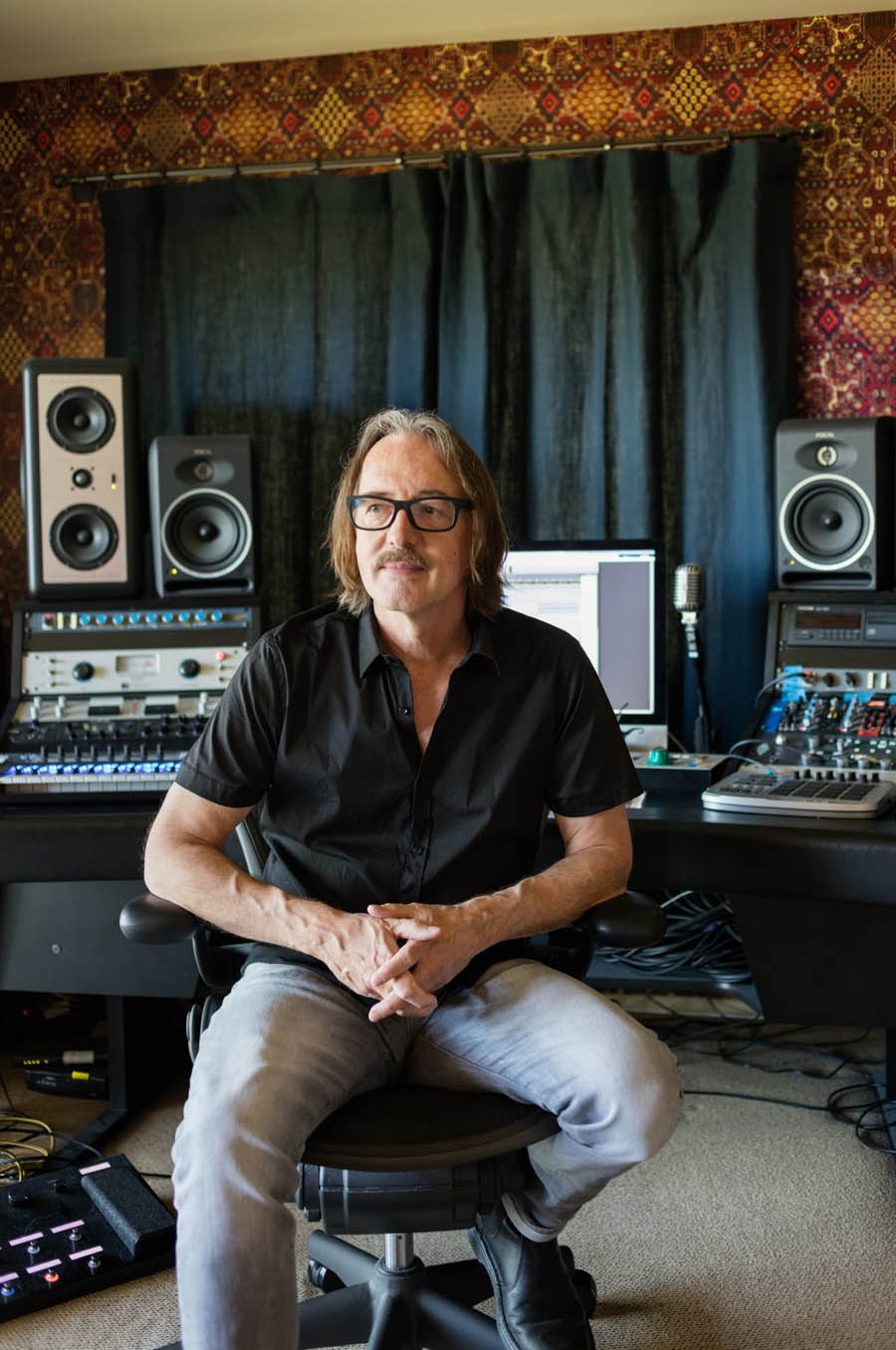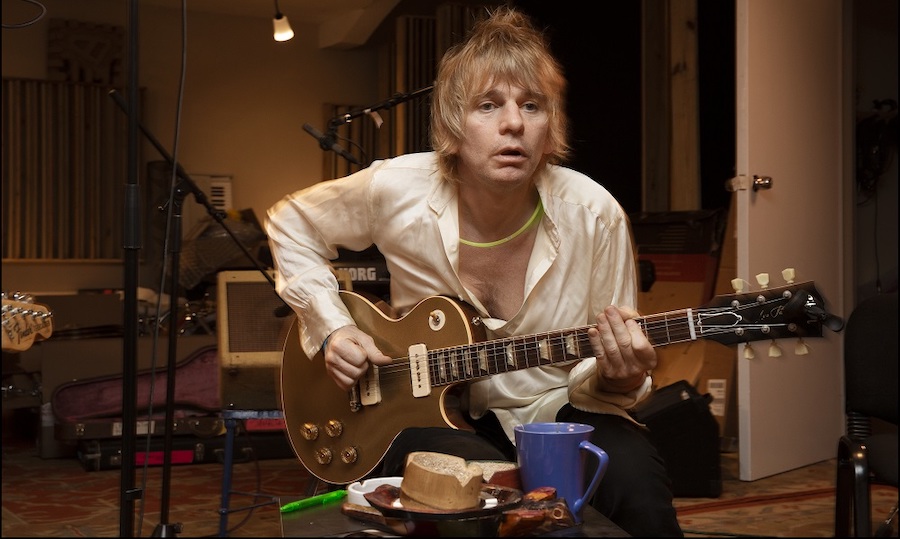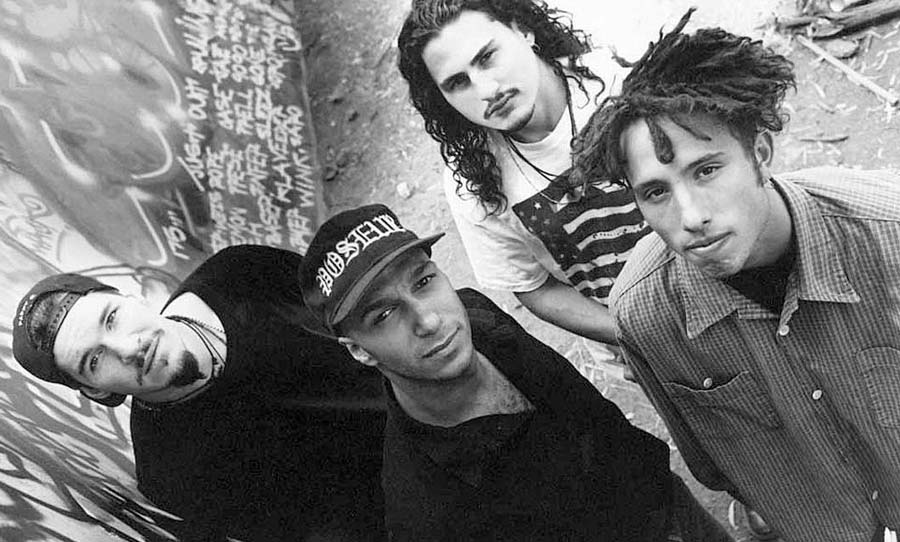Butch Vig has been there and definitely done that. But take one listen to Garbage’s brand new record No Gods No Masters and you’ll realise that none of the hunger has dissipated.
Remarkably, the dual strands of Butch Vig’s career have been equally as fruitful. In one, he’s the studio impresario and visionary who helmed the production of seminal rock records from Sonic Youth, The Smashing Pumpkins, and Nirvana.
In the other, he’s held down the drum grooves for Garbage for 25 years. This band has been his outlet for pursuing sounds outside of the traditions of rock; giving him licence to indulge in an ever-growing palette of sonic material and influences.
Dialling in for our chat from his Los Angeles home studio, with wine in hand, Butch Vig was in his happy place. But his band’s new record — the seventh in Garbage’s career — doesn’t come with a smile. No Gods No Masters is Garbage’s, unapologetically political, unflinching account of the world around them. To quote Vig: “It’s pissed off.”

HAPPY: You only need to peruse the tracklist of No Gods No Masters to understand the theme; The Men Who Ruled the World, A Woman Destroyed, Flipping the Bird and the title track, of course. Do you think that sense of rebellion is reflected in the sound of the record, and if so, how?
BUTCH: I think when Shirley started writing those lyrics in 2019 and finished them in early 2020, she was looking at the world around her. So musically, where we started this record, and where it ended up, is completely different. It had a spacious, almost beautiful, expanse to it, almost orchestral — from some of the initial demos and jams that we did back in Palm Springs in 2019.
As a band — when we heard what she was singing about — we just sharpened the music. It just got more abrasive, edgy, and fractured. It had to. It had to match her lyrics. Even though Shirley wrote the lyrics, she speaks for all four of us. We share similar sensibilities and that’s why we’re still a band after 25 years. So as Shirley finished up the lyrics, we just kept ratcheting it up.
No Gods No Masters is the most socio-political record that we’ve ever made. And as artists, we thought, “how you can we not write about the world that we see?” We realise that we’re not a pop band. We’re never going to get played on Top 40 radio anymore — we never really did anyway. So it’s freed us up to do whatever we want. It’s definitely the most political statement that we’ve ever made, but it feels good. It feels like who we are. As you know, Shirley is very outspoken and very opinionated and I feel like the music reflects that.
HAPPY: I think that’s perfectly encapsulated by the opener, The Men Who Ruled the World. Even within that track, there’s so much to unpack. The musical material seems to magically unfold from that slot machine sound at the beginning. Did the song come first? Or was it inspired by that memorable intro?
BUTCH: That song started with a very simple synth riff in the verse (mimics riff). Then Shirley started singing the line, “the men who ruled the world”. But that was all she had, just a few lines in the verse. It wasn’t until we took those original jams — and went back to LA and worked in our studio in Atwater called Red Razor — that we developed the song and came up with a chorus. Shirley wrote the lyrics after seeing a protest in Chile where women were protesting against the violation of their rights, misogyny, and government power. And that’s what the women chanted: “the violator, destroy the violator”. She put that into the song and all of a sudden, we had a chorus.
There’s a scene change when it goes into the chorus. The verse has a funky groove — it almost sounds like Talking Heads to me. But when it goes into the chorus, it’s more like Nine Inch Nails. It’s not groovy anymore. It’s pissed off. When Shirley sings “stuck inside my head” in the chorus, it’s a personal moment for her. And at the end when she sings, “the violator, destroy the violator”, she’s just unleashing on what she’s seen. As I’m saying this I’m sound really pretentious (laughs), but that’s just how we wrote the song. When Shirley asked about the sequence of the record, I said “we have to start with this track.” It sets the tone for the whole record. She thought about it for around two seconds and said, “I agree.”

HAPPY: The vocal tones are fascinating. There’s distortion in the verses, whispering pre-choruses, and increasing synthetic tones — almost like she’s being dehumanised. Are these production decisions being made while Shirley’s doing vocal takes, or is it afterwards, when you’re putting together the mix?
BUTCH: A lot of those decisions happened in the mixing process. When we put a song together, we usually get verses, choruses and bridges happening in rough form and we might edit sections of songs and move them around. But once we have a core arrangement… Garbage tends to over-record.
HAPPY: (Laughs).
BUTCH: We’ll do days like this: “let’s mute all the guitars and do all synthesizers and see what we can come up with” or “let’s just do weird samples and see what that’s like” then “let’s put one guitar in, then put in a synth”. A lot of the songs are defined in the mix, where we can decide what stays in and what gets taken out. And we usually take a lot out, because as I said, there are a lot of parts and ideas, so we have to strip away the things that aren’t working with Shirley’s vocals.
HAPPY: And do you have any favourite toys or techniques from your earlier work with Garbage or even your work as a producer with other bands that you just can’t resist?
BUTCH: We use a lot of effects pedals. I have them in my home studio here and at Red Razor and we run a lot of things through them. Not just guitars, but bass and drums and loops and sometimes Shirley’s vocals. It’s still a big part of our process to give some tonal character to whatever we’ve recorded. There’s no really specific thing because there are so many things. We have a giant palette of things that we use in the studio. Sometimes we try to avoid using the obvious things.
Duke and Steve love to use a couple of stompboxes on guitars, what we call ‘stun guns’ because they just have this blast. It’s easy to put those on and just go “wow” but we tried to use things that were a little quirkier on guitars and keyboards on this record. I did some programming here in my home studio. I use a lot of modular synths, especially on songs like Creeps. There are guitars of course, but that song was written on modular synths. It’s cool and it gives it a vibe, but to me, it sounds like punk rock.
HAPPY: The whole record seems to be constructed with sharp juxtapositions. The tracklisting is a rollercoaster — bouncing from tracks like Creeps to synth-pop ballads like Uncomfortably Me. Even within tracks — like in the way Shirley’s spooky delivery is set against the disco backdrop of Anonymous XXX. Is it a conscious decision to jam these unlikely elements together? Or does it come naturally to a band like Garbage?
BUTCH: I guess it does come naturally, but again, it comes together in the mix phase. But it is funny that you should mention those tracks, because this album, to me, sounds like a mutant cousin to our third album, Beautiful Garbage. Every song on that record had its own vibe. It’s very eclectic. And the new record is the same. Each song has its own vibe and sometimes, there are multiple vibes in each song. We’ve always been a band that does that. We’re totally cool with scene changes — the drum sound changes, the guitar sound changes, Shirley’s vocal changes.
Anonymous XXX, to me, sounds like a cross between Talking Heads and Roxy Music. I can imagine Bryan Ferry singing that song. The song starts with an acoustic guitar that Steve played that almost sounds like Psycho Killer. And the guitar/synth/sax riff kicks in, it sounds like Roxy Music.
HAPPY: There is some dark lyrical content, but there’s also an atmosphere of euphoria in tracks like Flipping the Bird and No Gods No Masters: they’re really made for the dancefloor. There’s an industrial, ‘ravey’ feel to it. Were you listening to different styles of music together as a band, to capture that vibe?
BUTCH: I was listening to — and watching — The Watchmen, with the score by Trent Reznor and Atticus Ross. I loved the series and I loved the soundtrack. Some of the synth stuff I did in some of the songs had a similar dystopian sound to it. But it’s hard to pinpoint because Garbage has this gigantic, wide palette that is brought into every song. But as wide as that palette is, there’s something about the way we make decisions and distil songs in the mix — that even if we tried to not sound like Garbage, we still sound like Garbage.
But I think that’s a good thing —we have a strong identity as a band — but Shirley is the MVP of Garbage. She has such a powerful, charismatic voice, which allows Duke, Steve and me, to go all over the place sonically, while she keeps it centred.
Garbage’s new album No Gods No Masters is out now. Stream it here.



